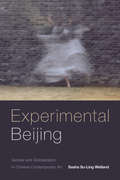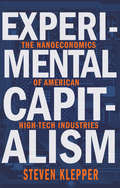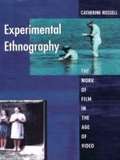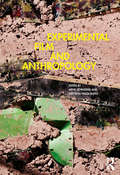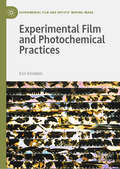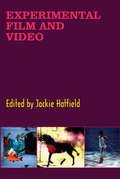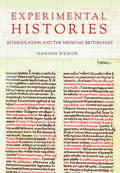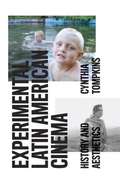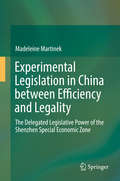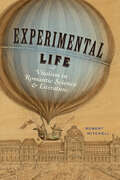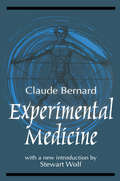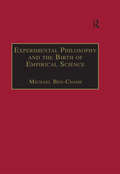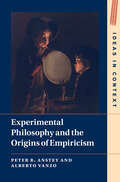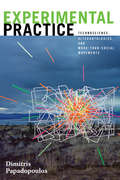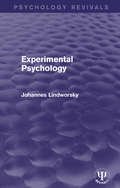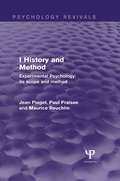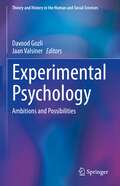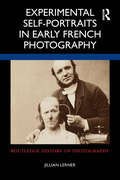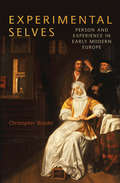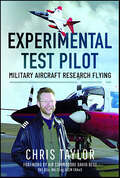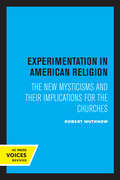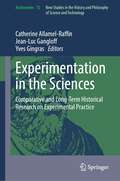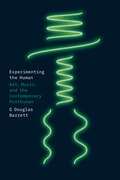- Table View
- List View
Experimental Beijing: Gender and Globalization in Chinese Contemporary Art
by Sasha Su-Ling WellandDuring the lead-up to the 2008 Beijing Olympics, the censorious attitude that characterized China's post-1989 official response to contemporary art gave way to a new market-driven, culture industry valuation of art. Experimental artists who once struggled against state regulation of artistic expression found themselves being courted to advance China's international image. In Experimental Beijing Sasha Su-Ling Welland examines the interlocking power dynamics in this transformational moment and rapid rise of Chinese contemporary art into a global phenomenon. Drawing on ethnographic fieldwork and experience as a videographer and curator, Welland analyzes encounters between artists, curators, officials, and urban planners as they negotiated the social role of art and built new cultural institutions. Focusing on the contradictions and exclusions that emerged, Welland traces the complex gender politics involved and shows that feminist forms of art practice hold the potential to reshape consciousness, produce a nonnormative history of Chinese contemporary art, and imagine other, more just worlds.
Experimental Capitalism
by John H. Miller Steven Klepper Serguey Braguinsky David A. HounshellFor much of the twentieth century, American corporations led the world in terms of technological progress. Why did certain industries have such great success? Experimental Capitalism examines six key industries--automobiles, pneumatic tires, television receivers, semiconductors, lasers, and penicillin--and tracks the highs and lows of American high-tech capitalism and the resulting innovation landscape. Employing "nanoeconomics"--a deep dive into the formation and functioning of companies--Steven Klepper determines how specific companies emerged to become the undisputed leaders that altered the course of their industry's evolution.Klepper delves into why a small number of firms came to dominate their industries for many years after an initial period of tumult, including General Motors, Firestone, and Intel. Even though capitalism is built on the idea of competition among many, he shows how the innovation process naturally led to such dominance. Klepper explores how this domination influenced the search for further innovations. He also considers why industries cluster in specific geographical areas, such as semiconductors in northern California, cars in Detroit, and tires in Akron. He finds that early leading firms serve as involuntary training grounds for the next generation of entrepreneurs who spin off new firms into the surrounding region. Klepper concludes his study with a discussion of the impact of government and the potential for policy to enhance a nation's high-tech industrial base.A culmination of a lifetime of research and thought, Experimental Capitalism takes a dynamic look at how new ideas and innovations led to America's economic primacy.
Experimental Ethnography: The Work of Film in the Age of Video
by Catherine RussellExperimental film and ethnographic film have long been considered separate, autonomous practices on the margins of mainstream cinema. By exploring the interplay between the two forms, Catherine Russell throws new light on both the avant-garde and visual anthropology. Russell provides detailed analyses of more than thirty-five films and videos from the 1890s to the 1990s and discusses a wide range of film and videomakers, including Georges Méliès, Maya Deren, Peter Kubelka, Ray Birdwhistell, Jean Rouch, Su Friedrich, Bill Viola, Kidlat Tahimik, Margaret Mead, Tracey Moffatt, and Chantal Akerman. Arguing that video enables us to see film differently--not as a vanishing culture but as bodies inscripted in technology, Russell maps the slow fade from modernism to postmodern practices. Combining cultural critique with aesthetic analysis, she explores the dynamics of historical interruption, recovery, and reevaluation. As disciplinary boundaries dissolve, Russell contends, ethnography is a means of renewing the avant-gardism of "experimental" film, of mobilizing its play with language and form for historical ends. "Ethnography" likewise becomes an expansive term in which culture is represented from many different and fragmented perspectives. Original in both its choice of subject and its theoretical and methodologicalapproaches, Experimental Ethnography will appeal to visual anthropologists, as well as film scholars interested in experimental and documentary practices.
Experimental Film and Anthropology (Criminal Practice Ser.)
by Arnd SchneiderExperimental Film and Anthropology urges a new dialogue between two seemingly separate fields. The book explores the practical and theoretical challenges arising from experimental film for anthropology, and vice versa, through a number of contact zones: trance, emotions and the senses, materiality and time, non-narrative content and montage. Experimental film and cinema are understood in this book as broad, inclusive categories covering many technical formats and historical traditions, to investigate the potential for new common practices. An international range of renowned anthropologists, film scholars and experimental film-makers engage in vibrant discussion and offer important new insights for all students and scholars involved in producing their own films. This is indispensable reading for students and scholars in a range of disciplines including anthropology, visual anthropology, visual culture and film and media studies.
Experimental Film and Photochemical Practices (Experimental Film and Artists’ Moving Image)
by Kim KnowlesThis book assesses the contemporary status of photochemical film practice against a backdrop of technological transition and obsolescence. It argues for the continued relevance of material engagement for opening up alternative ways of seeing and sensing the world. Questioning narratives of replacement and notions of fetishism and nostalgia, the book sketches out the contours of a photochemical renaissance driven by collective passion, creative resistance and artistic reinvention. Celluloid processes continue to play a key role in the evolution of experimental film aesthetics and this book takes a personal journey into the work of several key contemporary film artists. It provides fresh insight into the communities and infrastructures that sustain this vibrant field and mobilises a wide range of theoretical perspectives drawn from media archaeology, new materialism, ecocriticism and social ecology.
Experimental Film and Video
by Stephen Littman Jackie HatfieldThe past 40 years of technological innovation have significantly altered the materials of production and revolutionized the possibilities for experiment and exhibition. Not since the invention of film has there been such a critical period of major change in the imaging technologies accessible to artists. Bringing together key artists in film, video, and digital media, the anthology of Experimental Film and Video revisits the divergent philosophical and critical discourses of the 1970s and repositions these debates relative to contemporary practice. Forty artists have contributed images, and 25 artists reflect on the diverse critical agendas, contexts, and communities that have affected their practice across the period from the late 1960s to date. Along with an introduction by Jackie Hatfield and forewords by Sean Cubitt and Al Rees, this illustrated anthology includes interviews and recent essays by filmmakers, video artists, and pioneers of interactive cinema. Experimental Film and Video opens up the conceptual avenues for future practice and related critical writing.
Experimental Histories: Interpolation and the Medieval British Past
by Hannah WeaverIn Experimental Histories, Hannah Weaver examines the medieval practice of interpolation—inserting material from one text into another—which is often categorized as being a problematic, inauthentic phenomenon akin to forgery and pseudepigraphy. Instead, Weaver promotes interpolation as the signature form of medieval British historiography and a vehicle of historical theory, arguing that some of the most novel concepts of time in medieval historiography can be found in these altered narratives of the past.For Weaver, historiographical interpolation constitutes the traces of active experimentation with how best to write history, particularly the history of Britain. Historians in twelfth- and thirteenth-century Britain recognized the difficulty of enfolding complex events into a linear chronology and embraced innovative textual methods of creating history. Focusing on the Brut tradition but also analyzing the long history of interpolated historiography, including the Bayeux Embroidery, Experimental Histories offers a new interpretation of generic remixing in medieval writing about the past. Drawing on both manuscript studies and the new formalism, it shows that the practice of inserting materials from romance and hagiography allowed creative revisers to explore how lived events relate to passing time. By embracing interpolation, Weaver provides lively insights into the ways that time becomes history and human actors experience time.
Experimental Latin American Cinema: History and Aesthetics
by Cynthia TompkinsWhile there are numerous film studies that focus on one particular grouping of films—by nationality, by era, or by technique—here is the first single volume that incorporates all of the above, offering a broad overview of experimental Latin American film produced over the last twenty years. Analyzing seventeen recent films by eleven different filmmakers from Argentina, Brazil, Cuba, Mexico, Paraguay, and Peru, Cynthia Tompkins uses a comparative approach that finds commonalities among the disparate works in terms of their influences, aesthetics, and techniques. Tompkins introduces each film first in its sociohistorical context before summarizing it and then subverting its canonical interpretation. Pivotal to her close readings of the films and their convergences as a collective cinema is Tompkins’s application of Deleuzian film theory and the concept of the time-image as it pertains to the treatment of time and repetition. Tompkins also explores such topics as the theme of decolonization, the consistent use of montage, paratactically structured narratives, and the fusion of documentary conventions and neorealism with drama. An invaluable contribution to any dialogue on the avant-garde in general and to filmmaking both in and out of Latin America, Experimental Latin American Cinema is also a welcome and insightful addition to Latin American studies as a whole.
Experimental Legislation in China between Efficiency and Legality: The Delegated Legislative Power Of The Shenzhen Special Economic Zone
by Madeleine MartinekThis book analyzes the benefits of and legal concerns in connection with the delegated legislation of the Shenzhen Special Economic Zone as a prime example of experimental legislation in Chinese law. It offers solutions for improving the legal design of experimental regulations in Special Economic Zones by striking a balance between the pursuit of rapid socio-economic progress on the one hand, and the increasing need and will to govern by the rule of law on the other. The book offers a valuable guide for the academic community and legal practitioners, as well as students eager to gain insights into Chinese constitutional law and the conflict between legality and achieving reforms.
Experimental Life: Vitalism in Romantic Science and Literature
by Robert MitchellExperimental Life establishes the multiple ways in which Romantic authors appropriated the notion of experimentation from the natural sciences.Winner of the Michelle Kendrick Memorial Book Prize of the Society for Literature, Science, and the Arts, BSLS Book Prize of the British Society for Literature and ScienceIf the objective of the Romantic movement was nothing less than to redefine the meaning of life itself, what role did experiments play in this movement? While earlier scholarship has established both the importance of science generally and vitalism specifically, with regard to Romanticism no study has investigated what it meant for artists to experiment and how those experiments related to their interest in the concept of life.Experimental Life draws on approaches and ideas from contemporary science studies, proposing the concept of experimental vitalism to show both how Romantic authors appropriated the concept of experimentation from the sciences and the impact of their appropriation on post-Romantic concepts of literature and art.Robert Mitchell navigates complex conceptual arenas such as network theory, gift exchange, paranoia, and biomedia and introduces new concepts, such as cryptogamia, chylopoietic discourse, trance-plantation, and the poetics of suspension. As a result, Experimental Life is a wide-ranging summation and extension of the current state of literary studies, the history of science, cultural critique, and theory.
Experimental Medicine (Dover Books On Biology Ser.)
by Claude Bernard Stewart WolfThe French physiologist Claude Bernard was responisble for investigating the chemical phenomena of digestion. This text reproduces his research into experimental medicine. A new introduction looks at his impact on the world of medicine.
Experimental Philosophy and the Birth of Empirical Science: Boyle, Locke and Newton
by Michael Ben-ChaimHow did empirical research become the cornerstone of modern science? Scholars have traditionally associated empirical research with the search for knowledge, but have failed to provide adequate solutions to this basic historical problem. This book offers a different approach that focuses on human understanding - rather than knowledge - and its cultural expression in the creation and social transaction of causal explanations. Ancient Greek philosophers professed that genuine understanding of a particular subject was gained only when its nature, or essence, was defined. This ancient mode of explanation furnished the core teachings of late medieval natural philosophers, and was reaffirmed by early modern philosophers such as Bacon and Descartes. Yet during the second half of the 17th century, radical transformation gave rise to innovative research practices that were designed to explain how empirical properties of the physical world were correlated. The study unfolded in this book centres on the works of Robert Boyle, John Locke, and Isaac Newton - the most notable exponents of the 'experimental philosophy' in the late 17th century - to explore how this transformation led to the emergence of a recognizably modern culture of empirical research. Relating empirical with explanatory practices, this book offers a novel solution to one of the major problems in the history of western science and philosophy. It thereby provides a new perspective on the Scientific Revolution and the origins of modern empiricism. At the same time, this book demonstrates how historical and sociological tools can be combined to study science as an evolving institution of human understanding.
Experimental Philosophy and the Origins of Empiricism (Ideas in Context #145)
by Alberto Vanzo Peter R. AnsteyThe emergence of experimental philosophy was one of the most significant developments in the early modern period. However, it is often overlooked in modern scholarship, despite being associated with leading figures such as Francis Bacon, Robert Boyle, Isaac Newton, Jean Le Rond d'Alembert, David Hume and Christian Wolff. Ranging from the early Royal Society of London in the seventeenth century to the uptake of experimental philosophy in Paris and Berlin in the eighteenth, this book provides new terms of reference for understanding early modern philosophy and science, and its eventual eclipse in the shadow of post-Kantian notions of empiricism and rationalism. Experimental Philosophy and the Origins of Empiricism is an integrated history of early modern experimental philosophy which challenges the rationalism and empiricism historiography that has dominated Anglophone history of philosophy for more than a century.
Experimental Political Science
by Bernhard Kittel Wolfgang J. Luhan Rebecca B. MortonAn exploration of core problems in experimental research on voting behaviour and political institutions, ranging from design and data analysis to inferences with respect to constructs, constituencies and causal claims. The focus of is on the implementation of principles in experimental political science and the reflection of actual practices.
Experimental Practice: Technoscience, Alterontologies, and More-Than-Social Movements (Experimental Futures)
by Dimitris PapadopoulosIn Experimental Practice Dimitris Papadopoulos explores the potential for building new forms of political and social movements through the reconfiguration of the material conditions of existence. <P><P>Rather than targeting existing institutions in demands for social justice, Papadopoulos calls for the creation of alternative ontologies of everyday life that would transform the meanings of politics and justice. Inextricably linked to technoscience, these “alterontologies”—which Papadopoulos examines in a variety of contexts, from AIDS activism and the financialization of life to hacker communities and neuroscience—form the basis of ways of life that would embrace the more-than-social interdependence of the human and nonhuman worlds. <P><P>Speaking to a matrix of concerns about politics and justice, social movements, matter and ontology, everyday practice, technoscience, the production of knowledge, and the human and nonhuman, Papadopoulos suggests that the development of alterontologies would create more efficacious political and social organizing.
Experimental Psychology (Psychology Revivals)
by Johannes LindworskyOriginally published in German in 1923, this English edition was first published in 1931. From the translators preface: "Experimentelle Psychologie is characterized by an excellent summarizing of the most recent experimental data and by a spirit of fairness which it exhibits in organizing facts under general theoretical principles. Besides informing the reader, it stimulates him by critical remarks and suggestions for further thinking and experimentation." Today it can be read and enjoyed in its historical context.
Experimental Psychology Its Scope and Method: History and Method (Psychology Revivals)
by Jean Piaget Maurice Reuchlin Paul FraisseFirst published in English 1968, in this volume Paul Fraisse begins with history, looking at the evolution of experimental psychology, starting with its origins. He then moves on to the establishment of experimental psychology around the world. In the second chapter he discusses the experimental method. In the third chapter Jean Piaget tackles the questions of explanation and parallelism and their problems within experimental psychology. The final chapter by Maurice Reuchlin goes on to discuss measurement in psychology looking at various scales with their experimental conditions and numerical properties.
Experimental Psychology: Ambitions and Possibilities (Theory and History in the Human and Social Sciences)
by Jaan Valsiner Davood GozliThis work brings together different perspectives on psychological methods and particularly methods involving experimentation. To encourage a reflective use of research methods, the authors illuminate the historical, philosophical, and scientific dimensions of methodology, providing both defenses and criticisms of experimental psychology. The primary audience of the work are students and researchers in psychological and behavioral sciences, who have an interest in methodology
Experimental Self-Portraits in Early French Photography (Routledge History of Photography)
by Jillian LernerThis book explores a range of experimental self-portraits made in France between 1840 and 1870, including remarkable images by Hippolyte Bayard, Nadar, Duchenne de Boulogne, and Countess de Castiglione. Adapting photography for different social purposes, each of these pioneers showcased their own body as a living artifact and iconic attraction. Jillian Lerner considers performative portraits that exhibit uncanny transformations of identity and embodiment. She highlights the tactical importance of photographic demonstrations, promotions, conversations, and the mongrel forms of montage, painted photographs, and captioned specimens. The author shows how photographic practices are mobilized in diverse cultural contexts and enmeshed with the histories of art, science, publicity, urban spectacle, and private life in nineteenth-century France. Tracing calculated and creative approaches to a new medium, this research also contributes to an archaeology of the present. It furnishes a prehistory of the “selfie” and offers historical perspectives on the forces that reshape human perception and social experience. This interdisciplinary study will appeal to readers interested in the history of photography, art, visual culture, and media studies.
Experimental Selves: Person and Experience in Early Modern Europe
by Christopher BraiderDrawing on the generous semantic range the term enjoyed in early modern usage, Experimental Selves argues that ‘person,’ as early moderns understood this concept, was an ‘experimental’ phenomenon—at once a given of experience and the self-conscious arena of that experience. Person so conceived was discovered to be a four-dimensional creature: a composite of mind or 'inner' personality; of the body and outward appearance; of social relationship; and of time. Through a series of case studies keyed to a wide variety of social and cultural contexts, including theatre, the early novel, the art of portraiture, pictorial experiments in vision and perception, theory of knowledge, and the new experimental science of the late-seventeenth and eighteenth centuries, the book examines the manifold shapes person assumed as an expression of the social, natural, and aesthetic ‘experiments’ or experiences to which it found itself subjected as a function of the mere contingent fact of just having them.
Experimental Test Pilot: Military Aircraft Research Flying
by Chris TaylorChris Taylor has had a very successful career as a Royal Navy officer, helicopter pilot, test pilot, instructor and as an internationally acclaimed civil certification test pilot. His first book, Test Pilot, concentrates on anecdotes and incidents from the most recent phase of his career. This book is the prequel and is his account of his ten years’ service as an experimental test pilot, from 1994 until 2004, at MoD Boscombe Down, the UK’s tri-Service home of military aircraft testing and evaluation. In this book, Chris explains what led to his passion to be a test pilot and how, with tenacity, he plays the cards he was dealt as well as he could. The story captures the difficulties and challenges associated with being selected for the single annual place at the Empire Test Pilots’ School (ETPS) and the dedication required to then complete the very demanding twelve-month course. Chris was one of only three helicopter experimental test pilots posted to the Experimental Flying Squadron (EFS). It was there that he worked with scientists from the defense Research Agency (DRA) at Bedford and Farnborough on a number of cutting-edge technologies, specializing in ship/helicopter interface testing. In addition to flying the Westland Wessex, Lynx and Sea King, Chris was able to act as an evaluation pilot in the Hunter, Jaguar, Andover, Hawker Siddeley HS748, and the Comet. During his time as an active test pilot, EFS was merged into three platform squadrons which gave Chris the chance to play a full part in conventional ‘release to service’ activities in a wide variety of rotorcraft. Asked to take on the role of a flight test instructor (FTI), Chris served at ETPS where he made sweeping changes to the syllabus, acquired a new helicopter type and had to deal with a number of students who could not cope with the rigors of the course. In his first year he suffered a ‘flame out’ in a Hawk jet, an engine failure during his first flight in the twin-engine Basset and crashed the school’s Westland Scout helicopter– all of which are fully discussed. Following four successful years teaching helicopter flight test, Chris was recruited to manage the ETPS short course portfolio. This required the design, sale and delivery of numerous flight test courses, while also introducing innovative teaching methods and the use of civil registered aircraft. In this new, exciting and rewarding role Chris taught both fixed wing and rotary wing students and the book explains the difficulties of learning the additional skills and flight test techniques required of a fixed wing test pilot. This autobiography explores the military flight test career of an individual who is arguably one of the best qualified and most experienced test pilots working today anywhere in the world.
Experimentation in American Religion: The New Mysticisms and Their Implications for the Churches
by Robert WuthnowThis title is part of UC Press's Voices Revived program, which commemorates University of California Press’s mission to seek out and cultivate the brightest minds and give them voice, reach, and impact. Drawing on a backlist dating to 1893, Voices Revived makes high-quality, peer-reviewed scholarship accessible once again using print-on-demand technology. This title was originally published in 1978.
Experimentation in the Sciences: Comparative and Long-Term Historical Research on Experimental Practice (Archimedes #72)
by Yves Gingras Catherine Allamel-Raffin Jean-Luc GangloffThis book takes a novel approach by highlighting comparative and long-term historical perspectives on experimental practice. The juxtaposition of accounts of natural, social, and medical experimentation is very enlightening, especially because the authors put the emphasis on the different kinds of objects of experimentation (physical matter, chemical reagents, social groups, organizations, sick individuals, archeological remains) and demonstrate how much the kinds of objects matter for the practice of experimentation, its methods, tools, and methodologies. Taken together, the chapters raise several fascinating questions for further study: What do these different approaches have in common? Why do we call them “experimentation”? What are the intersections among the fields and their developments? The volume engages philosophical approaches that are not well known to Anglophone readers (Bachelard, Bergson, Bernard, Canguilhem, among others) and brings to attention a wealth of Francophone secondary literature on past and present scientific experimentation. The collection fills a yawning gap in science, science studies, and philosophy of science teaching, making it particularly valuable philosophers and historians of science in all subfields.
Experimenting the Human: Art, Music, and the Contemporary Posthuman
by G Douglas BarrettAn engaging argument about what experimental music can tell us about being human. In Experimenting the Human, G Douglas Barrett argues that experimental music speaks to the contemporary posthuman, a condition in which science and technology decenter human agency amid the uneven temporality of postwar global capitalism. Time moves forward for some during this period, while it seems to stand still or even move backward for others. Some say we’re already posthuman, while others endure the extended consequences of never having been considered fully human in the first place. Experimental music reflects on this state, Barrett contends, through its interdisciplinary involvements in postwar science, technology, and art movements. Rather than pursuing the human's beyond, experimental music addresses the social and technological conditions that support such a pursuit. Barrett locates this tendency of experimentalism throughout its historical entanglements with cybernetics, and in his intimate analysis of Alvin Lucier’s neurofeedback music, Pamela Z’s BodySynth performances, Nam June Paik’s musical robotics, Pauline Oliveros’s experiments with radio astronomy, and work by Laetitia Sonami, Yasunao Tone, and Jerry Hunt. Through a unique meeting of music studies, media theory, and art history, Experimenting the Human provides fresh insights into what it means to be human.
Experimenting the Human: Art, Music, and the Contemporary Posthuman
by G Douglas BarrettAn engaging argument about what experimental music can tell us about being human. In Experimenting the Human, G Douglas Barrett argues that experimental music speaks to the contemporary posthuman, a condition in which science and technology decenter human agency amid the uneven temporality of postwar global capitalism. Time moves forward for some during this period, while it seems to stand still or even move backward for others. Some say we’re already posthuman, while others endure the extended consequences of never having been considered fully human in the first place. Experimental music reflects on this state, Barrett contends, through its interdisciplinary involvements in postwar science, technology, and art movements. Rather than pursuing the human's beyond, experimental music addresses the social and technological conditions that support such a pursuit. Barrett locates this tendency of experimentalism throughout its historical entanglements with cybernetics, and in his intimate analysis of Alvin Lucier’s neurofeedback music, Pamela Z’s BodySynth performances, Nam June Paik’s musical robotics, Pauline Oliveros’s experiments with radio astronomy, and work by Laetitia Sonami, Yasunao Tone, and Jerry Hunt. Through a unique meeting of music studies, media theory, and art history, Experimenting the Human provides fresh insights into what it means to be human.
